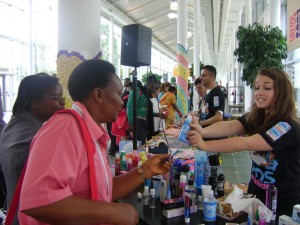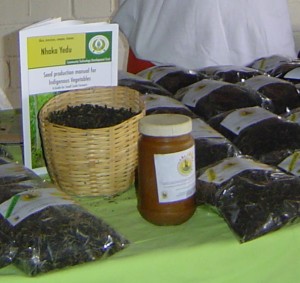So, go ahead, call me a salad
Friday, July 23rd, 2010 by Fungai MachiroriOn a recent visit to my grandmother’s rural home, I remarked to my uncle how sad it is that when I have children of my own, all of their grandparents will be city-dwelling creatures who won’t boast scenic views of misted mountain ranges, free-roaming cattle and grass-thatched rondawels.
“Ah, but you can’t be sure of that yet,” he quipped. “You could get married to a man whose parents live in the rural areas and who loves to go and see them often.”
I am not too sure whether the grimace I felt growing within, after that statement was made, actually seeped through my flesh and crept all the way up to my face. Marry a man whose parents live where and who loves to do what?!
Now, I know those types well – the urban dwellers whose lungs can’t take the smell of diesel and industrialisation for any protracted amount of time, and who must therefore drive off to the ‘roots’ (that’s Zimbabwean slang for one’s rural home) at any opportunity. Public holidays, Christmas, Easter, annual leave – name the calendar dates and these men are on their merry way.
I have absolutely no problem with this whatsoever. Showing love and appreciation for where you come from is a sign of humility and respect. So bravo to all of those who have embraced their heritage.
But please don’t expect me to be the first to be kitted out in faithful pursuit at the suggestion of each and every road trip to see my in-laws and their string of relatives.
Let’s go through the reasons why.
It isn’t just rural folk who want to see what mettle a mroora (daughter-in-law) is made of. But they make the greatest demands on you to find out whether you really were worth all those cows given away as your bride price.
They want to know if you can cook, clean and do every other wifely task they know of from their own mental handbooks.
And note, cooking here is not for some previously planned dinner party of eight guests who all get place names. In this instance, it’s more like cooking for the whole village – aunts, uncles, brothers, sisters, brothers of aunts of great uncles and any other relation you can think of!
Oh, and I neglect to mention that this is cooking by fire.
In a drum.
With a big old log for you to stir the pap around with as it gurgles and threatens to erupt all over your face.
I laugh at the thought of my even attempting such feats of heroism.
Ah, and then there’s the small matter of plucking feathers from newly deceased chickens which, in their final moments, you watched coursing about the yard headless and bloody.
I have to pass on that one too because I have real issues with cooking or eating something that I have seen living.
Call me crazy, but I grow attached to livestock. I watch and learn their different characters and even give them names and nationalities. In fact, in just this last visit to my grandmother I reincarnated one of her hens as a moody painter called Pierrick cocking his head to and fro (in the previous life the hen was male!) and fixing his eyes on angular shapes and edgy colours.
So don’t think for one moment that I could ever partake of the cooking and eating of Pierrick and others of his kith and kin.
Fetching water from a well kilometres away and then balancing a full bucket over my head? And actually walking with it?
Pass again.
But my personal favourite is getting all of this done before the first cock crows and with the whispers behind my aching back about when exactly it is that I will show my fertility by falling pregnant.
Did I just chuckle out loud? I am not so sure because no one else is in the room.
The chuckle, whether audible or otherwise, is induced by the fact that I am involved in a well-documented unshakeable romance with my pillows. So much so is sleep the glory of my life that I have since forfeited the spectacle of picturesque sunrises for it.
I will forfeit a whole lot more, even at the risk of being called a salad. In Zimbabwe, people who are considered to be ‘raw’ in a cultural sense, are derisively referred to as salads – no particular type of salad, just anything that’s made up of raw ingredients.
Oh, and who really understands the idea of getting married and enjoying your spouse’s company for a few years before birthing a brood of noisy rugrats? Just you wait more than a year and listen as everyone speculates that you are barren and that you need that special healing that the pastor who lives on a distant mountain top gives.
I am in no way making light of rural life. Rural communities have their own systems, proud rituals and traditions. And these are what keep them functional.
But I am at an age where I can be honest with myself.
I will never be a size 10. I will not be a fashion designer when I grow up. And I will not be the typical traditional wife.
My way of life is a fusion of things – an acculturation of different ways and beliefs about how I feel that I can most benefit the various structures within society, including family.
I am not a domestic goddess. I can be competent at house work, but nothing more. And whoever I marry, if I marry, has to understand that.
So no eyes gawking at me and vetting my competencies, thank you! The rustic life wasn’t made for some.
And for this narration of my reservations, call me a salad if you want. In fact, call me a Waldorf salad. At least I can munch away at bits of apples and nuts while you chew over my audacity.
Bon appetite!











